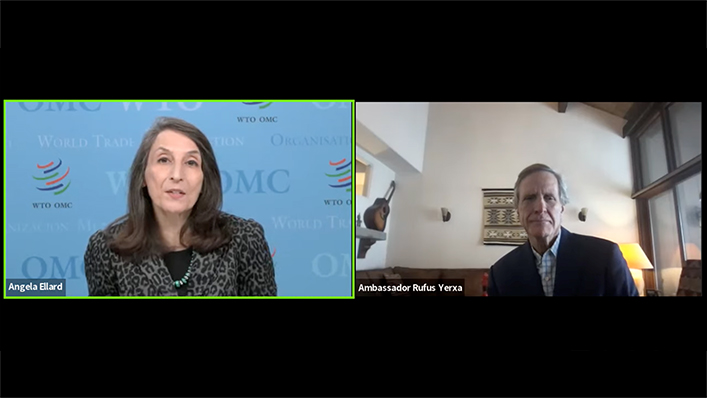
DDG Ellard emphasized there are grounds for optimism about the future of the multilateral trading system after the successful conclusion of MC12. Members managed to reach meaningful outcomes on most of the issues before them, except for agriculture, she said. Most notably, members added a new binding agreement – the Agreement on Fisheries Subsidies – to the WTO rulebook.
This success shows the significance of the WTO to its members, as well as demonstrating that consensus is still possible, even in times of deep geopolitical rifts, she added.
However, DDG Ellard emphasized that there is a lot of work ahead of MC13 set to take place in February 2024, including agricultural reform, the second wave of negotiations on fisheries subsidies, whether to extend the MC12 TRIPS Decision on COVID-19 vaccines to diagnostics and therapeutics, the possible extension of the e-commerce moratorium, as well as various development-related issues.
She also underscored the importance of the Agreement on Fisheries Subsidies entering into force so that it can begin to deliver for ocean sustainability. She explained that two-thirds of WTO members must accept the Agreement for it to become operational. Switzerland and Singapore were the first to deposit their instruments of acceptance with the WTO, and acceptance procedures are well underway by many other members, she said. She asked government officials in the audience to prioritize this work for the sake of fish, the ocean and the livelihood of those that depend on them.
DDG Ellard emphasized the WTO needs reform across its three pillars of negotiation, implementation and dispute settlement. It is up to WTO members to establish a common understanding of what kind of reform is needed and how to achieve it, she noted.
With respect to dispute settlement reform, DDG Ellard recalled that, at MC12, members agreed “to conduct discussions with a view to having a fully and well-functioning dispute settlement system accessible to all Members by 2024”. She noted that the lack of finality in the process of dispute settlement makes the need for reform more acute. While the United States’ recent engagement in initiating informal discussions on dispute settlement reform has been a welcome development, members need to accelerate and enhance this process if we are to stay on track for 2024, she said.
DDG Ellard emphasized that the dispute settlement system has not ground to a halt, with eight new disputes initiated in 2022 and 18 panel proceedings currently under way. Members are also resorting to alternative means for resolving disputes, including arbitration and the multi-party interim appeal arrangement (MPIA) process.
DDG Ellard also underscored the importance of food security in the ongoing agriculture negotiations. She noted that although the feed, food and fertilizer markets situation has generally improved since the outbreak of the war in Ukraine, trends in some regions are worrying. She asked that members move from their entrenched positions and make the necessary concessions to achieve concrete action to strengthen global agricultural trade rules.
Commenting on the development aspect of the WTO’s work, DDG Ellard noted how development is addressed in the fisheries subsidies negotiations. She pointed to the trust fund established to help developing country members and least developed countries implement the Agreement on Fisheries Subsidies. In addition, she said that the second wave of negotiations includes many issues of interest to developing countries, such as special and differential treatment, including treatment of subsidies for small-scale and artisanal fishing.
She also pointed to the climate crisis as an issue of particular concern to developing countries. “The climate crisis is becoming even more severe, and we are seeing a lot of responses that are unilateral, fragmented, leading to decision-making that may not take into account the interests of developing members,” she stated.
DDG Ellard emphasized the importance of eliminating tariffs and non-tariff barriers on environmental goods and services. She noted that, according to WTO estimates, eliminating barriers on environmental goods could increase global exports in these products by 5% by 2030, which could lead to a 0.6 % reduction in net carbon emissions. While there are signs that members would be interested in renewing negotiations on an environmental goods agreement, more enthusiasm is needed to re-launch these talks, she said.
“An agreement like this could have a fundamental impact, and I hope that our members can agree to step up their efforts and do this,” DDG Ellard concluded.
The full video of the armchair conversation with DDG Ellard is available here.
Share
Reach us to explore global export and import deals